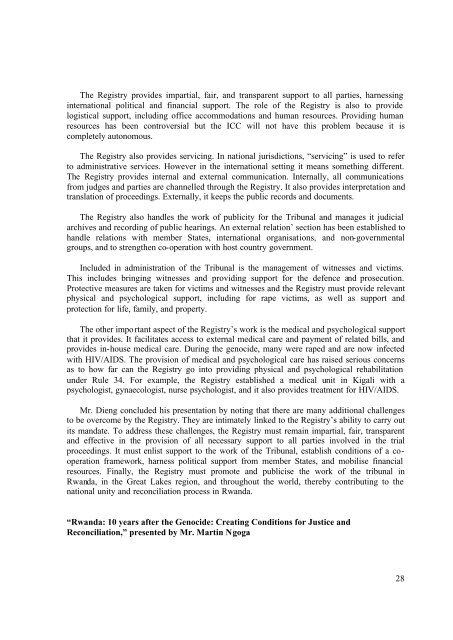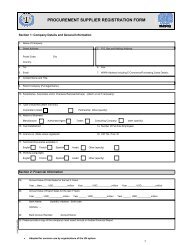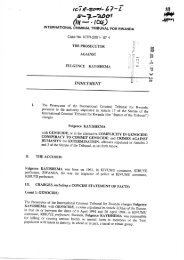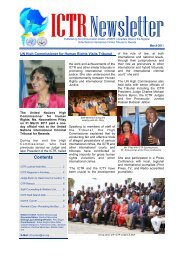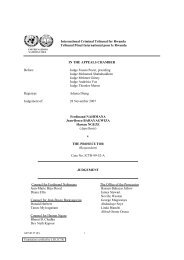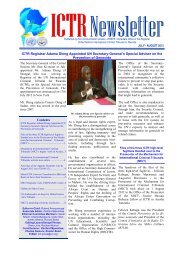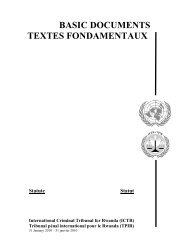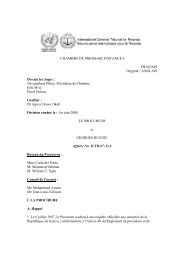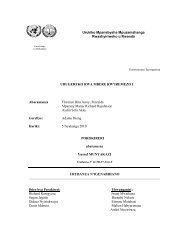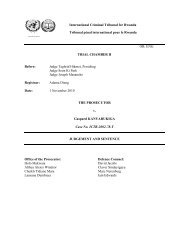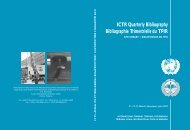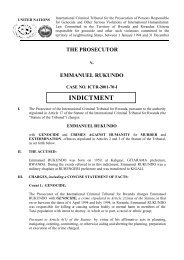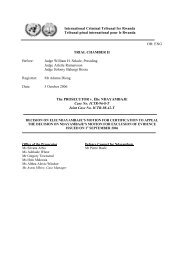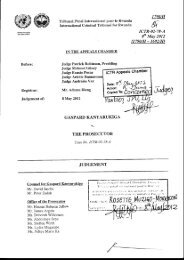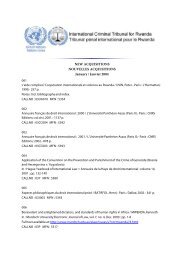Report of Proceedings - International Criminal Tribunal for Rwanda
Report of Proceedings - International Criminal Tribunal for Rwanda
Report of Proceedings - International Criminal Tribunal for Rwanda
Create successful ePaper yourself
Turn your PDF publications into a flip-book with our unique Google optimized e-Paper software.
The Registry provides impartial, fair, and transparent support to all parties, harnessing<br />
international political and financial support. The role <strong>of</strong> the Registry is also to provide<br />
logistical support, including <strong>of</strong>fice accommodations and human resources. Providing human<br />
resources has been controversial but the ICC will not have this problem because it is<br />
completely autonomous.<br />
The Registry also provides servicing. In national jurisdictions, “servicing” is used to refer<br />
to administrative services. However in the international setting it means something different.<br />
The Registry provides internal and external communication. Internally, all communications<br />
from judges and parties are channelled through the Registry. It also provides interpretation and<br />
translation <strong>of</strong> proceedings. Externally, it keeps the public records and documents.<br />
The Registry also handles the work <strong>of</strong> publicity <strong>for</strong> the <strong>Tribunal</strong> and manages it judicial<br />
archives and recording <strong>of</strong> public hearings. An external relation’ section has been established to<br />
handle relations with member States, international organisations, and non-governmental<br />
groups, and to strengthen co-operation with host country government.<br />
Included in administration <strong>of</strong> the <strong>Tribunal</strong> is the management <strong>of</strong> witnesses and victims.<br />
This includes bringing witnesses and providing support <strong>for</strong> the defence and prosecution.<br />
Protective measures are taken <strong>for</strong> victims and witnesses and the Registry must provide relevant<br />
physical and psychological support, including <strong>for</strong> rape victims, as well as support and<br />
protection <strong>for</strong> life, family, and property.<br />
The other important aspect <strong>of</strong> the Registry’s work is the medical and psychological support<br />
that it provides. It facilitates access to external medical care and payment <strong>of</strong> related bills, and<br />
provides in-house medical care. During the genocide, many were raped and are now infected<br />
with HIV/AIDS. The provision <strong>of</strong> medical and psychological care has raised serious concerns<br />
as to how far can the Registry go into providing physical and psychological rehabilitation<br />
under Rule 34. For example, the Registry established a medical unit in Kigali with a<br />
psychologist, gynaecologist, nurse psychologist, and it also provides treatment <strong>for</strong> HIV/AIDS.<br />
Mr. Dieng concluded his presentation by noting that there are many additional challenges<br />
to be overcome by the Registry. They are intimately linked to the Registry’s ability to carry out<br />
its mandate. To address these challenges, the Registry must remain impartial, fair, transparent<br />
and effective in the provision <strong>of</strong> all necessary support to all parties involved in the trial<br />
proceedings. It must enlist support to the work <strong>of</strong> the <strong>Tribunal</strong>, establish conditions <strong>of</strong> a cooperation<br />
framework, harness political support from member States, and mobilise financial<br />
resources. Finally, the Registry must promote and publicise the work <strong>of</strong> the tribunal in<br />
<strong>Rwanda</strong>, in the Great Lakes region, and throughout the world, thereby contributing to the<br />
national unity and reconciliation process in <strong>Rwanda</strong>.<br />
“<strong>Rwanda</strong>: 10 years after the Genocide: Creating Conditions <strong>for</strong> Justice and<br />
Reconciliation,” presented by Mr. Martin Ngoga<br />
28


